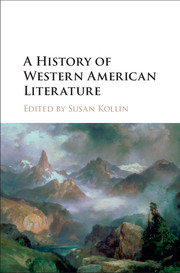Book contents
- Frontmatter
- Contents
- Notes on Contributors
- Acknowledgments
- Introduction: Historicizing the American Literary West
- PART I HOMELANDS
- PART II MAKING A REGION
- PART III GEOGRAPHIES OF THE LITERARY WEST
- PART IV THE TWENTIETH CENTURY AND BEYOND: LITERARY MOVEMENTS AND CRITICAL PERSPECTIVES
- 14 Early Cinematic Westerns
- 15 The Environmental Novel of the American West
- 16 Hard-Boiled Fiction and Noir Narratives
- 17 The Beats and the American West
- 18 Contested Wests: Indigenous Americans and the Literature of Sovereignty
- 19 Asian American Writers and the Making of the Western U.S. Landscape
- 20 African American Literature: Recasting Region through Race
- 21 Hollywood Westerns: 1930s to the Present
- 22 Urban New Wests
- 23 Queer Frontiers: Gender and Sexuality in the American West
- 24 Postwestern Literature and Criticism
- Selected Bibliography
- Index
20 - African American Literature: Recasting Region through Race
from PART IV - THE TWENTIETH CENTURY AND BEYOND: LITERARY MOVEMENTS AND CRITICAL PERSPECTIVES
Published online by Cambridge University Press: 05 November 2015
- Frontmatter
- Contents
- Notes on Contributors
- Acknowledgments
- Introduction: Historicizing the American Literary West
- PART I HOMELANDS
- PART II MAKING A REGION
- PART III GEOGRAPHIES OF THE LITERARY WEST
- PART IV THE TWENTIETH CENTURY AND BEYOND: LITERARY MOVEMENTS AND CRITICAL PERSPECTIVES
- 14 Early Cinematic Westerns
- 15 The Environmental Novel of the American West
- 16 Hard-Boiled Fiction and Noir Narratives
- 17 The Beats and the American West
- 18 Contested Wests: Indigenous Americans and the Literature of Sovereignty
- 19 Asian American Writers and the Making of the Western U.S. Landscape
- 20 African American Literature: Recasting Region through Race
- 21 Hollywood Westerns: 1930s to the Present
- 22 Urban New Wests
- 23 Queer Frontiers: Gender and Sexuality in the American West
- 24 Postwestern Literature and Criticism
- Selected Bibliography
- Index
Summary
The West of the African American imagination and experience has played a subordinate role to the dominant “Great Migration” story, which unfolded along a South-North axis. Moreover, the racialized conventions associated with the frontier myth and western narratives have necessarily excluded African Americans. Crudely put, black folks have not belonged in the stereotypical story of the conquest of the West, in which whites fight Indians on the plains in a contest between the virtues of civilization and nature. African Americans feature in a different foundational national drama and space: the problem of slavery in the Deep South and the road to emancipation. Working both with and against such proscriptions, African American writers engaged with the West have created two allied legacies, one that is in conversation with the tropes of the rural or wild frontier and another that documents arrival on an urban frontier.
The Black Wild West
Despite its literary invisibility, the journey west was clearly part of the black American experience. Key black figures can be traced back to the 1520s and Estevanico, the Moroccan Berber slave and primary scout for the Spanish exploration of what is now the United States–Mexico borderland, including the mission to find the Seven Cities of Gold or “Cibola.” Or York, William Clark's slave who participated fully in the Lewis and Clark expedition, as scout, hunter, and manual laborer, from St. Louis to the Pacific coast and back, 1804–6. And James Beckwourth, a mixed race ex-slave who journeyed west from St. Louis in the 1820s to trap fur and trade in the Rockies, discovering a pass over the Sierra Mountains and becoming an adopted Crow Indian with the name of Morning Sun.
Importantly, and unprecedented for a mountain man let alone a nonwhite one, Beckwourth published a full account of his life in 1856. The Life and Adventures of James P. Beckwourth, Mountaineer, Scout, and Pioneer and Chief of the Crow Nation of Indians is a mix of fact, gross exaggeration, and hubris that, in complying with frontier literature conventions, compromised what we assume to be autobiography. That he would spin a larger-than-life yarn and sell it as a true story, however, was consistent with Beckwourth's status as an intrepid mountain man adventurer.
- Type
- Chapter
- Information
- A History of Western American Literature , pp. 314 - 330Publisher: Cambridge University PressPrint publication year: 2015

